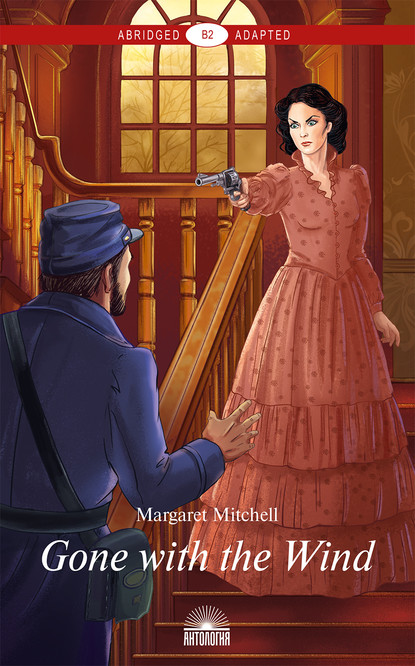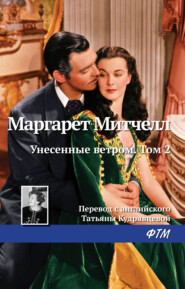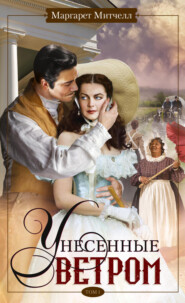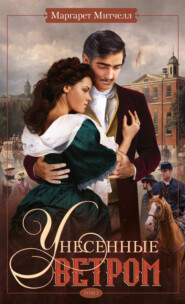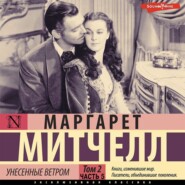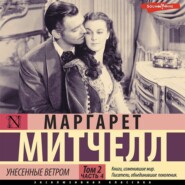По всем вопросам обращайтесь на: info@litportal.ru
(©) 2003-2024.
✖
Gone with the Wind / Унесённые ветром
Настройки чтения
Размер шрифта
Высота строк
Поля
“Yes, he can do all those things, but his heart’s not in it. That’s why I say he’s queer.”
Scarlett was silent and her heart sank, for she knew Gerald was right.
Gerald patted her arm and said: “There now, Scarlett! You admit ’tis true. And when I’m gone – darlin’, listen to me! I’ll leave Tara to you —”
“I don’t want Tara or any old plantation. Plantations don’t mean anything when —”
She was going to say “when you haven’t the man you want,” but Gerald got furious.
“Do you stand there, Scarlett O’Hara, and tell me that Tara – that land – doesn’t mean anything?”
Scarlett nodded obstinately. “Land is the only thing in the world,” he shouted, “worth working for, worth fighting for – worth dying for.”
“Oh, Pa,” she said, “you talk like an Irishman!”
“Have I ever been ashamed of it? No, ’tis proud I am. And don’t be forgetting that you are half Irish, Miss! And to anyone with a drop of Irish blood in them the land they live on is like their mother. ’Tis ashamed of you I am this minute.”
Gerald had begun to work himself up into a rage when something in Scarlett’s face stopped him.
“But there, you’re young. ’Twill come to you, this love of land, if you’re Irish. You’re just a child and bothered about your beaux. When you’re older, you’ll be seeing how ’tis…”
By this time, Gerald was tired of the conversation and annoyed that the problem should be upon his shoulders.
“Now, Miss. It doesn’t matter who you marry, as long as he thinks like you and is a gentleman and a Southerner. For a woman, love comes after marriage.”
“Oh, Pa, that’s such an Old Country notion!”
“And a good notion it is! All this American business of marrying for love, like servants, like Yankees! The best marriages are when the parents choose for the girl. For how can a silly piece like yourself tell a good man from a scoundrel?”
Gerald looked at her bowed head.
“It’s not crying you are?” he questioned, trying to turn her face upward.
“No,” she cried, jerking away.
“It’s lying you are, and I’m proud of it. And I want to see pride in you tomorrow at the barbecue.”
Gerald took her arm and passed it through his.
“We’ll be going in to supper now, and all this is between us. I’ll not be worrying your mother with this – nor do you do it either. Blow your nose, daughter.”
They started up the dark drive arm in arm, the horse following slowly. Near the house, Scarlett saw her mother and behind her was Mammy, holding in her hand the black leather bag in which Ellen O’Hara always carried the bandages and medicines she used in doctoring the slaves.
“Mr. O’Hara,” called Ellen as she saw the two coming up the driveway – Ellen belonged to a generation that was formal even after seventeen years of marriage – “Mr. O’Hara, there is illness at the Slattery house. Emmie’s baby has been born and is dying and must be baptized. I am going there with Mammy to see what I can do.”
“In the name of God!” said Gerald. “Why should those white trash take you away just at your supper hour and just when I’m wanting to tell you about the war talk that’s going on in Atlanta! Go, Mrs. O’Hara. You’d not rest easy on your pillow the night if there was trouble and you not there to help.”
“Take my place at the table, dear,” said Ellen, patting Scarlett’s cheek softly.
Gerald helped his wife into the carriage and gave orders to the coachman to drive carefully.
Then, smiling, in anticipation of one of his practical jokes: “Come daughter, let’s go tell Pork that instead of buying Dilcey, I’ve sold him to John Wilkes.”
He had already forgotten Scarlett’s heartbreak. Scarlett slowly climbed the steps after him, her feet leaden. She thought that, after all, a mating between herself and Ashley could be no queerer than that of her father and Ellen Robillard O’Hara. As always, she wondered how her loud, insensitive father had managed to marry a woman like her mother, for never were two people more different.
Chapter III
Ellen O’Hara was thirty-two years old, and, according to the standards of her day, she was a middle-aged woman. From her French mother had come her dark eyes and her black hair; and from her father she had her long straight nose and her squarecut jaw. She would have been a beautiful woman had there been any glow in her eyes, any warmth in her smile. She never raised a voice in command to a servant or reproof to a child but it was obeyed instantly at Tara.
As far back as Scarlett could remember, her mother had always been the same. She had never seen her mother sit down without a bit of needlework in her hands. Ellen moved about the house superintending the cooking, the cleaning and the clothes-making for the plantation.
Sometimes when Scarlett went at night to kiss her mother’s cheek, she wondered if her mother had ever giggled or whispered secrets to intimate girl friends. But no, that wasn’t possible. Mother had always been just as she was, the one person who knew the answers to everything.
But Scarlett was wrong, for, years before, Ellen Robillard of Savannah[14 - Саванна, город в штате Джорджия, на побережье Атлантического океана] had giggled as any fifteen-year-old and whispered with friends, telling all secrets but one. That was the year when Gerald O’Hara, twenty-eight years older than she, came into her life – the year, too, when her black-eyed cousin, Philippe Robillard, went out of it. For when Philippe left Savannah forever, he took with him the glow that was in Ellen’s heart and left for the bandy-legged little Irishman who married her only a gentle shell.
But that was enough for Gerald. And if anything was gone from her, he never missed it. He knew that it was a miracle that he, an Irishman with no family and wealth, should win the daughter of one of the wealthiest and proudest families on the Coast. For Gerald was a self-made man.
Gerald had come to America from Ireland when he was twenty-one.
He liked the South, and he soon became, in his own opinion, a Southerner. There was much about the South – and Southerners – that he would never understand: but he adopted its ideas and customs, as he understood them – poker and horse racing, red-hot politics, States’ Rights and damnation to all Yankees, slavery and King Cotton, contempt for white trash and courtesy to women. He even learned to chew tobacco. There was no need for him to acquire a good head for whisky, he had been born with one.
They were a pleasant race, these coastal Georgians, and Gerald liked them. From them he learned what he found useful. Poker and a steady head for whisky brought to Gerald two of his three most prized possessions, his valet and his plantation. The other was his wife, the mysterious kindness of God.
Gerald wanted to be a slave owner and a landed gentleman. So the possession of Pork, his first slave, who became his valet, was the first step toward his heart’s desire.
Then the hand of Fate and a hand of poker combined to give him the plantation which he afterwards called Tara, and at the same time moved him out of the Coast into the upland country of north Georgia.
With his own small stake and a neat sum from mortgaging the land, Gerald bought his first field hands and came to Tara to live in bachelor solitude in the former owner’s house, till such a time as the white walls of Tara should rise.
He cleared the fields and planted cotton and borrowed more money to buy more slaves. Gradually the plantation widened out, as Gerald bought more acres lying near him, and in time the white house became a reality instead of a dream.
It was built by slave labor, a clumsy building overlooking the green pasture land running down to the river; and it pleased Gerald greatly. The old oaks hugged the house closely with their great trunks. The lawn grew thick with clover and grass, and Gerald saw to it that it was well kept. There was an air of solidness, of stability and permanence about Tara, and whenever Gerald galloped around the bend in the road and saw his own roof rising through green branches, his heart swelled with pride.
Gerald was on excellent terms with all his neighbors in the County, except the MacIntoshes whose land was on his left and the Slatterys whose three acres stretched on his right along the swamp bottoms between the river and John Wilkes’ plantation.
With all the rest of the County, Gerald was on terms of amity. The Wilkeses, the Calverts, the Tarletons, the Fontaines, all smiled when the small figure on the big white horse galloped up their driveways. Gerald was likable, and soon the neighbors learned what the children, negroes and dogs discovered at first sight, that a kind heart, a ready and sympathetic ear and an open pocketbook were behind his loud voice and his rude manner.
When Gerald was forty-three, it came to him that Tara, dear though it was, and the County folk, with their open hearts and open houses, were not enough. He wanted a wife.
Tara cried out for a mistress.
The urgent need of a wife became clear to him one morning when he was dressing to ride to town for Court Day. Pork brought forth his favorite ruffled shirt, badly mended by the chambermaid.
“Mist’ Gerald,” said Pork, as Gerald fumed, “whut you needs is a wife.”
Gerald knew that Pork was right. He wanted a wife and he wanted children and, if he did not acquire them soon, it would be too late. But he was not going to marry just anyone. His wife must be a lady of blood, with as many airs and graces[15 - с хорошими манерами] as Mrs. Wilkes and the ability to manage Tara as well as Mrs. Wilkes.
But there were two difficulties in the way of marriage into the County families. The first was the scarcity of girls of marriageable age. The second, and more serious one, was that Gerald was a “new man” and a foreigner. No one knew anything about his family.
Scarlett was silent and her heart sank, for she knew Gerald was right.
Gerald patted her arm and said: “There now, Scarlett! You admit ’tis true. And when I’m gone – darlin’, listen to me! I’ll leave Tara to you —”
“I don’t want Tara or any old plantation. Plantations don’t mean anything when —”
She was going to say “when you haven’t the man you want,” but Gerald got furious.
“Do you stand there, Scarlett O’Hara, and tell me that Tara – that land – doesn’t mean anything?”
Scarlett nodded obstinately. “Land is the only thing in the world,” he shouted, “worth working for, worth fighting for – worth dying for.”
“Oh, Pa,” she said, “you talk like an Irishman!”
“Have I ever been ashamed of it? No, ’tis proud I am. And don’t be forgetting that you are half Irish, Miss! And to anyone with a drop of Irish blood in them the land they live on is like their mother. ’Tis ashamed of you I am this minute.”
Gerald had begun to work himself up into a rage when something in Scarlett’s face stopped him.
“But there, you’re young. ’Twill come to you, this love of land, if you’re Irish. You’re just a child and bothered about your beaux. When you’re older, you’ll be seeing how ’tis…”
By this time, Gerald was tired of the conversation and annoyed that the problem should be upon his shoulders.
“Now, Miss. It doesn’t matter who you marry, as long as he thinks like you and is a gentleman and a Southerner. For a woman, love comes after marriage.”
“Oh, Pa, that’s such an Old Country notion!”
“And a good notion it is! All this American business of marrying for love, like servants, like Yankees! The best marriages are when the parents choose for the girl. For how can a silly piece like yourself tell a good man from a scoundrel?”
Gerald looked at her bowed head.
“It’s not crying you are?” he questioned, trying to turn her face upward.
“No,” she cried, jerking away.
“It’s lying you are, and I’m proud of it. And I want to see pride in you tomorrow at the barbecue.”
Gerald took her arm and passed it through his.
“We’ll be going in to supper now, and all this is between us. I’ll not be worrying your mother with this – nor do you do it either. Blow your nose, daughter.”
They started up the dark drive arm in arm, the horse following slowly. Near the house, Scarlett saw her mother and behind her was Mammy, holding in her hand the black leather bag in which Ellen O’Hara always carried the bandages and medicines she used in doctoring the slaves.
“Mr. O’Hara,” called Ellen as she saw the two coming up the driveway – Ellen belonged to a generation that was formal even after seventeen years of marriage – “Mr. O’Hara, there is illness at the Slattery house. Emmie’s baby has been born and is dying and must be baptized. I am going there with Mammy to see what I can do.”
“In the name of God!” said Gerald. “Why should those white trash take you away just at your supper hour and just when I’m wanting to tell you about the war talk that’s going on in Atlanta! Go, Mrs. O’Hara. You’d not rest easy on your pillow the night if there was trouble and you not there to help.”
“Take my place at the table, dear,” said Ellen, patting Scarlett’s cheek softly.
Gerald helped his wife into the carriage and gave orders to the coachman to drive carefully.
Then, smiling, in anticipation of one of his practical jokes: “Come daughter, let’s go tell Pork that instead of buying Dilcey, I’ve sold him to John Wilkes.”
He had already forgotten Scarlett’s heartbreak. Scarlett slowly climbed the steps after him, her feet leaden. She thought that, after all, a mating between herself and Ashley could be no queerer than that of her father and Ellen Robillard O’Hara. As always, she wondered how her loud, insensitive father had managed to marry a woman like her mother, for never were two people more different.
Chapter III
Ellen O’Hara was thirty-two years old, and, according to the standards of her day, she was a middle-aged woman. From her French mother had come her dark eyes and her black hair; and from her father she had her long straight nose and her squarecut jaw. She would have been a beautiful woman had there been any glow in her eyes, any warmth in her smile. She never raised a voice in command to a servant or reproof to a child but it was obeyed instantly at Tara.
As far back as Scarlett could remember, her mother had always been the same. She had never seen her mother sit down without a bit of needlework in her hands. Ellen moved about the house superintending the cooking, the cleaning and the clothes-making for the plantation.
Sometimes when Scarlett went at night to kiss her mother’s cheek, she wondered if her mother had ever giggled or whispered secrets to intimate girl friends. But no, that wasn’t possible. Mother had always been just as she was, the one person who knew the answers to everything.
But Scarlett was wrong, for, years before, Ellen Robillard of Savannah[14 - Саванна, город в штате Джорджия, на побережье Атлантического океана] had giggled as any fifteen-year-old and whispered with friends, telling all secrets but one. That was the year when Gerald O’Hara, twenty-eight years older than she, came into her life – the year, too, when her black-eyed cousin, Philippe Robillard, went out of it. For when Philippe left Savannah forever, he took with him the glow that was in Ellen’s heart and left for the bandy-legged little Irishman who married her only a gentle shell.
But that was enough for Gerald. And if anything was gone from her, he never missed it. He knew that it was a miracle that he, an Irishman with no family and wealth, should win the daughter of one of the wealthiest and proudest families on the Coast. For Gerald was a self-made man.
Gerald had come to America from Ireland when he was twenty-one.
He liked the South, and he soon became, in his own opinion, a Southerner. There was much about the South – and Southerners – that he would never understand: but he adopted its ideas and customs, as he understood them – poker and horse racing, red-hot politics, States’ Rights and damnation to all Yankees, slavery and King Cotton, contempt for white trash and courtesy to women. He even learned to chew tobacco. There was no need for him to acquire a good head for whisky, he had been born with one.
They were a pleasant race, these coastal Georgians, and Gerald liked them. From them he learned what he found useful. Poker and a steady head for whisky brought to Gerald two of his three most prized possessions, his valet and his plantation. The other was his wife, the mysterious kindness of God.
Gerald wanted to be a slave owner and a landed gentleman. So the possession of Pork, his first slave, who became his valet, was the first step toward his heart’s desire.
Then the hand of Fate and a hand of poker combined to give him the plantation which he afterwards called Tara, and at the same time moved him out of the Coast into the upland country of north Georgia.
With his own small stake and a neat sum from mortgaging the land, Gerald bought his first field hands and came to Tara to live in bachelor solitude in the former owner’s house, till such a time as the white walls of Tara should rise.
He cleared the fields and planted cotton and borrowed more money to buy more slaves. Gradually the plantation widened out, as Gerald bought more acres lying near him, and in time the white house became a reality instead of a dream.
It was built by slave labor, a clumsy building overlooking the green pasture land running down to the river; and it pleased Gerald greatly. The old oaks hugged the house closely with their great trunks. The lawn grew thick with clover and grass, and Gerald saw to it that it was well kept. There was an air of solidness, of stability and permanence about Tara, and whenever Gerald galloped around the bend in the road and saw his own roof rising through green branches, his heart swelled with pride.
Gerald was on excellent terms with all his neighbors in the County, except the MacIntoshes whose land was on his left and the Slatterys whose three acres stretched on his right along the swamp bottoms between the river and John Wilkes’ plantation.
With all the rest of the County, Gerald was on terms of amity. The Wilkeses, the Calverts, the Tarletons, the Fontaines, all smiled when the small figure on the big white horse galloped up their driveways. Gerald was likable, and soon the neighbors learned what the children, negroes and dogs discovered at first sight, that a kind heart, a ready and sympathetic ear and an open pocketbook were behind his loud voice and his rude manner.
When Gerald was forty-three, it came to him that Tara, dear though it was, and the County folk, with their open hearts and open houses, were not enough. He wanted a wife.
Tara cried out for a mistress.
The urgent need of a wife became clear to him one morning when he was dressing to ride to town for Court Day. Pork brought forth his favorite ruffled shirt, badly mended by the chambermaid.
“Mist’ Gerald,” said Pork, as Gerald fumed, “whut you needs is a wife.”
Gerald knew that Pork was right. He wanted a wife and he wanted children and, if he did not acquire them soon, it would be too late. But he was not going to marry just anyone. His wife must be a lady of blood, with as many airs and graces[15 - с хорошими манерами] as Mrs. Wilkes and the ability to manage Tara as well as Mrs. Wilkes.
But there were two difficulties in the way of marriage into the County families. The first was the scarcity of girls of marriageable age. The second, and more serious one, was that Gerald was a “new man” and a foreigner. No one knew anything about his family.





